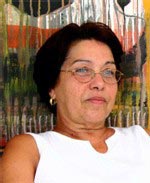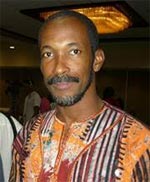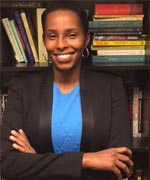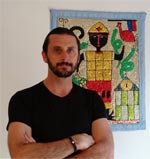Listed below are the candidates for Vice President and Executive Council 2016-2017. Voting will be available and carried out as usual at the CSA-Haiti conference.
| Vice-President, Executive Council 2016-2017 The Vice-President serves for one year after which she/he assumes the Presidency: |
|
Yolanda Wood lives in Cuba and currently teaches art at the University of Havana, where she founded the History of Caribbean Art programme, and has also taught in several other Caribbean countries (Mexico, Jamaica, Haiti, Martinique, etc.). Yolanda has also held the positions of Dean of the Faculty of Arts and Literature at the University of Havana, Deputy Vice-Chancellor of the Cuban University of Arts and Cultural Attaché at the Cuban Embassy in Paris. Highly active in cultural circles, she attends a great many national and international symposia and other events on the theme of Caribbean identity. Yolanda Wood specializes in the analysis of contemporary Caribbean literature and art. Moreover, she has penned diverse publications, particularly on the theme of art, in addition to contributing to several newspapers such as Lettres de Cuba. She has also written a wide range of texts for exhibition catalogues on Caribbean artists. Yolanda was the Director of the Center of Caribbean Studies in Casa de las Americas ( 2006-2016). She has also contributed to some collective publications, including Art public, une collection d’art contemporain en Guadeloupe and, in 2012, Caribbean: Art at the Crossroads of the World. |
| Member, Executive Council (Two positions) 2016-2018 Executive Council Members serve for a two year term. |
|
Dr. Furé Davis teaches courses in English language, Anglophone Caribbean and diasporic literatures, English-Spanish translation, Caribbean Popular Culture and Cultural Theory in the School of Foreign Languages at the University of Havana. Prior to his present post, Professor Furé Davis taught Spanish language and translation at the University of Ghana, and the Ghana Institute of Languages in Accra, Ghana. A very active member of the Caribbean Studies Association (CSA) for the past 17 years, Professor Furé Davis was the winner of the “Pinos Nuevos” Prize in 2000 for his essay Cantos de Resistencia. He has written and published numerous articles and papers about Rastafari, reggae, Cuban racial issues, Caribbean-Canadian poetry among other themes; his publications have appeared in Cuban, Caribbean, U.S., and European journals. His most recent book, La Cultura Rastafari en Cuba, (Editorial Oriente, 2011) was awarded the Catauro Cubano prize by the “Fernando Ortiz” Foundation. Moreover, his recent research interests have led him to conduct research on the intellectual tradition of the region, including Marcus Garvey, on Cuba’s popular consciousness and migration-determined family narratives, among other aspects. |
|
Since 2002 when he returned permanently to Curaçao, Dr. Hawkins has taught at a number of institutions of higher education on Curaçao. He has taught behavioural science and clinical ethics at St. Martinus University School of Medicine in both full-time and part-time capacities, research methods and statistics in the hospitality and tourism management program at the Intercontinental University of the Caribbean (ICUC) in a part-time capacity, and has been full-time at the University of Curaçao Dr. Moises da Costa Gomez (UoC) since 2004, where he is an Associate Professor of Research Methods and the Director of Research in the Faculty of Social Sciences and Economics. He is also the acting chair holder of the UoC UNESCO Chair on Sustainable Development of Caribbean Small Island Developing States (SIDS). Dr. Hawkins has conducted research and served on committees as a research consultant for a variety of organizations and institutions including the Curaçao North Sea Jazz Festival, the Curaçao International Film Festival Rotterdam, the Curaçao Tourism Board, the Central Bureau of Statistics of Curaçao, the Curaçao Civil Aviation Authority, the Ministry of Social Development, Labour, and Welfare, the Directorate of Child and Youth Development, the Department of Foreign Relations Curaçao, the Ministry of Economic Development, the United Nations Development Program Curaçao, and the Curaçao UNESCO National Committee. |
|
Dr. Prosper recently received her Ph.D. in Global & Sociocultural Studies with a concentration in Cultural Anthropology as well as graduate certificates in African & African Diaspora Studies and Women’s and Gender Studies from Florida International University. She also holds an M.S. in Conflict Analysis and Resolution from Nova Southeastern University as well as a B.A. in Political Science and Africana Studies from Barnard College, Columbia University. Her research focuses on social movements in Latin America and the Caribbean. More specifically, her doctoral work centered on a coalition of social movement organizations calling for an end to the ongoing “Occupation” of Haiti. Prosper has served as an organizer with land and housing rights organizations Take Back the Land and Haitian Women in Miami (FANM) in the U.S. She has also served as a sub-editor on the CSA Newsletter Editing Team as well as the Coordinator of the Journal of the Bureau of Ethnology of Haiti. Presently, she is developing a book project that explores the body politics that shape citizenship and national belonging in Spanish-speaking Latin America and the Caribbean through an examination of their constitutions and special laws for the exclusion or inclusion of Afrodescendant people. |
|
Supported by the National Science Foundation Senior and CAREER Grant, Bellagio Center, and others, Schuller’s research on NGOs, globalization, disasters, and gender in Haiti has been published in two dozen book chapters and peer-reviewed articles as well as public media, including a column in Huffington Post. Dr. Schuller is the author of two monographs, including Humanitarian Aftershocks in Haiti (Rutgers, 2016) and co-editor of five volumes, including Tectonic Shifts: Haiti since the Earthquake (Kumarian Press, 2012). He is co-director / co-producer of documentary Poto Mitan: Haitian Women, Pillars of the Global Economy (2009). Schuller is co-editor of Berghahn Books’ Catastrophes in Context: a Series in Engaged Social Science on Disasters and University of Alabama Press’ NGOgraphies: a Series of Ethnographic Reflections of NGOs. Recipient of the Margaret Mead Award, he is board chair of the Lambi Fund of Haiti and active in several solidarity efforts. “I am honored to be a nominee for the Vice Presidency of the CSA. Far and away the CSA is my favorite conference, one that I most look forward to. Since my first CSA in 2007, I have only missed one. CSA has played an important role in my growth as an emerging scholar. In addition to wanting to give back by supporting the program for graduate students, I am committed to CSA because of its real concern to interdisciplinarity. This is admittedly fragile with a wide range of epistemologies and scholarly dialogues represented. I would like to help strengthen this, specifically encouraging cross-disciplinary plenaries, panels, and other events. Another fragile but unique aspect of CSA is its commitment to multi-lingualism; this fledgling initiative deserves institutional support.” |

 Dr. Yolanda Wood Pujols: professor, researcher, art critic and curator.
Dr. Yolanda Wood Pujols: professor, researcher, art critic and curator. Dr. Samuel Furé Davis: Professor, University of Havana.
Dr. Samuel Furé Davis: Professor, University of Havana. 
 Dr. Mamyrah Prosper: Postdoctoral Teaching Scholar at North Carolina State University in Interdisciplinary Studies.
Dr. Mamyrah Prosper: Postdoctoral Teaching Scholar at North Carolina State University in Interdisciplinary Studies. Dr. Mark Schuller: Associate Professor of Anthropology and NGO Leadership and Development at Northern Illinois University and affiliate at the Faculté d’Ethnologie, l’Université d’État d’Haïti.
Dr. Mark Schuller: Associate Professor of Anthropology and NGO Leadership and Development at Northern Illinois University and affiliate at the Faculté d’Ethnologie, l’Université d’État d’Haïti.